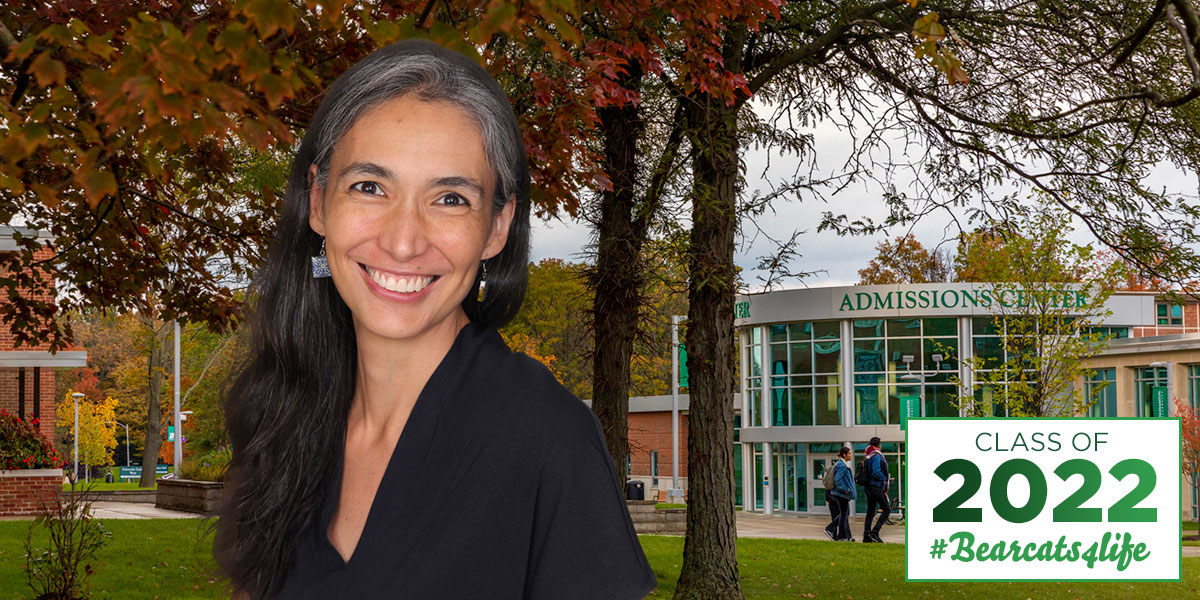Commencement 2022 profile: Jessica Vargas Gonzalez
Harpur student navigates international move, motherhood and loss while earning her PhD

Doctoral candidates must always overcome an array of obstacles: challenging coursework and original research, the long hours of writing a book-length dissertation, conference presentations, the final defense, publication pressures.
Now imagine two international moves during that time, the first in the effort to migrate from a country in political and economic crisis. Imagine a vibrant family life, a newborn baby. Imagine a cherished mentor’s sudden death.
Then, you might understand why Jessica Vargas’ doctorate is truly a victory.
Originally from Venezuela, Vargas — who goes by Jessica Vargas Gonzalez in her scholarly work —is earning her doctorate in philosophy from Binghamton University in May 2022. A specialist in social and political philosophy, she previously earned two bachelor’s degrees in philosophy and economics at Central University of Venezuela, followed by a master’s degree in continental philosophy from the University of Warwick in England.
Her dissertation concerns the involvement of emotions in political life. Traditionally, scholars have focused on a rational conception of agency that marginalizes emotions, although that focus is starting to change, she acknowledged.
Nor are emotions a simple subject. While often categorized as positive or negative — for instance, compassion and love, on one hand, versus anger or fear on the other — the picture is much more complicated in practice because the same emotion can play constructive or destructive roles in the political sphere. That calls for more nuanced normative distinctions regarding how emotions are mobilized in politics, she said.
Her dissertation was inspired by the political crisis in her home country, which she and her family left for Binghamton in 2016.
“Venezuela has been a very politically polarized country for a long while now, probably 20 years,” she said. “Right now, many countries have become polarized, including the United States. That’s why it was important for me to address the issue of how emotions are engaged, how dangerous they can be, but also how essential they are to politics.”
That migration wasn’t her family’s last. After her husband landed a job in Mexico, Vargas and their two girls joined him in Mexico City in 2018. She has been working remotely ever since, both conducting research and writing her dissertation.
At Binghamton
Vargas came to Binghamton with a specific goal in mind: to study political philosophy and the work of philosopher Hannah Arendt with a scholar she admired: Professor of Philosophy and Women, Gender and Sexuality Studies Bat-Ami Bar On. Also the founding director of the Institute for Advanced Studies in the Humanities, Bar On’s research focused on violent political conflict and social-political order, particularly as it applies to refugees.
As her advisor, Bar On was incredibly supportive of Vargas and her family from the very start. In fact, the professor encouraged Vargas to bring her then-four-month-old child to lectures with her, so she could pursue both scholarship and motherhood at the same time.
“She helped me to navigate being a mother and a PhD student,” Vargas remembered. “She would always ask how the little ones were doing, and when we were settling in Binghamton, she recommended a pediatrician, playgrounds, restaurants. It made the transition much easier for me.”
That support continued after Vargas relocated to Mexico. Bar On helped keep her on track with regular meetings and conversations about her dissertation research, functioning as her main connection to the University.
In November 2020, Bar On died at the age of 72 after a stroke.
“I miss her and I would have really loved to be able to finish the process with her,” said Vargas, who is now applying to postdoctoral fellowships in Mexico. “We had just discussed the last chapter of my dissertation, but she didn’t get to read it.”
Professor of Philosophy Lisa Tessman then stepped in as Vargas’ advisor, ensuring a smooth transition as she completed her doctoral program. Two other Arendt scholars also came forward to serve on Vargas’ dissertation committee: Professor Richard Bernstein from the New School for Social Research and York University Professor Alice MacLachlan, both of whom gave her finished dissertation the highest praise, Tessman said.
“Jessica’s dissertation is truly outstanding, and her dissertation defense was one of the best I have seen in years. The committee unanimously agreed that she should be nominated for the Distinguished Dissertation Award,” Tessman said. “It only breaks my heart that Ami, as her original advisor, did not get to have the joy of seeing Jessica finish her dissertation. Ami would have been happy and proud. And I wish that Jessica had gotten to hear Ami express that.”
